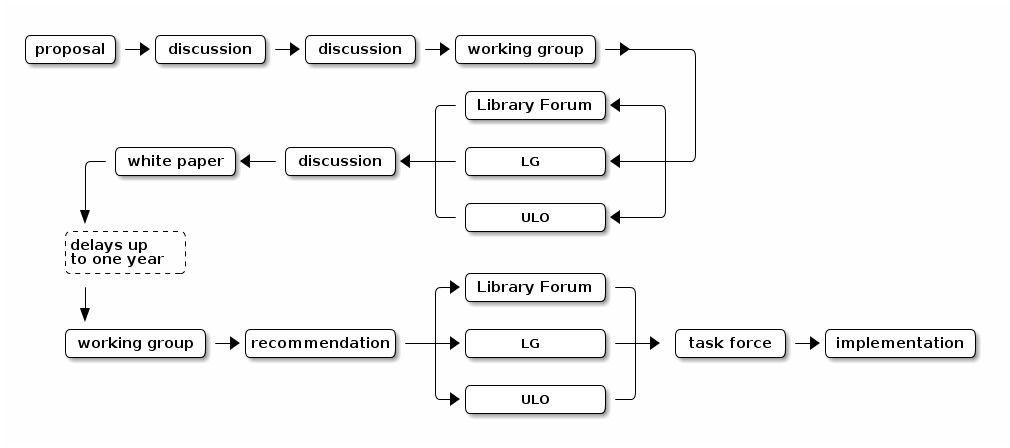Earlier this week I distributed a proposal to my colleagues: A Modest Proposal for a More Efficient Organizational Decision-Making Effectiveness Structure at York University Libraries. The full document is available in our institutional repository, and will be of interest to librarians thinking about institutional effectiveness and potential reorganization. Here is an excerpt.
Our current inefficient process
The current York University Libraries (YUL) decision-making process is outlined in Figure 1.

There are certainly some advantages to this method: foremost is the number of opportunities it offers for discussion, analysis and critique of ideas. All librarians and archivists have several chances to offer their opinions and to speak for or against something (sometimes both in the same meeting).
But the process is obviously inefficient. Sometimes the same people and same groups hear about and argue over the same idea several times in the space of weeks. Streamlining the process will save people time and allow more concentrated and productive focus on the idea at hand. The process also inefficiently scatters both problemizing and problematizing across those people and groups: sometimes it is unclear whether they should do one, the other, or both, in what order.
Problemization and problematization
Before I set out the more efficient process, we must distinguish between problemizing and problematizing. The OED defines them:
- "Problemize. v. intr. To discuss or consider problems."
- "Problematize v. intr. To render problematic; to view, interpret, or analyse (an issue, discipline, etc.) as a problem or system of problems to be solved."
To problemize is simple: "There is a problem with X because Y." To problematize is more complex, but is explained by Foucault (1990) in his usual lucid prose: "Problematisation doesn't mean representation of a pre-existing object, nor the creation by discourse of an object that doesn't exist. It is the totality of discursive or non-discursive practices that introduces something into the play of true and false and constitutes it as an object for thought (whether in the form of moral reflection, scientific knowledge, political analysis, etc.)."[*]
Both problemizing and problematizing are part of my proposed solution: the Problem(at)ization Committee.
[*] To say something is "problematic" can be used in either sense. For example, a proposal to keep the Frost Library open 24 hours a day, 365 days a year, is problematic (in the problemize sense) for many reasons: not enough staff, increased costs, university is closed on statutory holidays and over Christmas, etc. It is also problematic in the problematize sense because it raises issues of Frost's role at Glendon, Glendon's role in York, why a library should be open at all, and, if it should, why Frost is being privileged over a Keele campus library. Therefore I propose that in our discourse we use problemic for the first sense (as in, "Can you cover my reference desk shift tomorrow?" "I'm afraid that's problemic.") and problematic for the second sense (as in, "Can you cover my reference desk shift tomorrow?" "I'm afraid that's problematic.").
 Miskatonic University Press
Miskatonic University Press